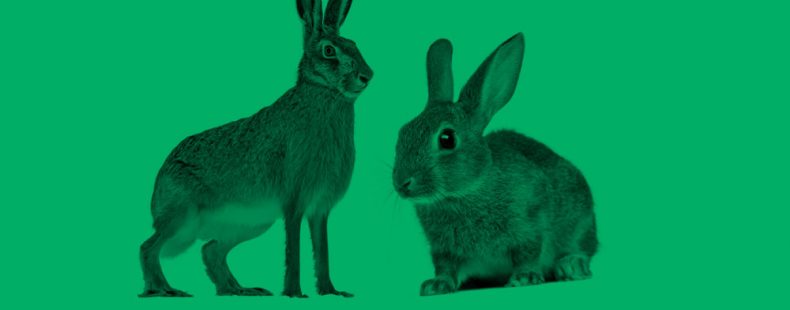Ever heard someone say “rabbit rabbit,” but there’s not a floppy-eared bunny to be found for miles?
There’s a reason they’re saying it … and that reason may even convince you to start saying it too, if you haven’t already. Keep reading to find out why this saying may be your next morning mantra.
What does rabbit rabbit mean?
Though it sounds a bit like gibberish, the phrase rabbit rabbit is a long-held superstition thought to bring about good luck. But it’s not to be uttered just any old random day. Rather, if you say it on the first day of the month before any other words come out of your mouth, then luck is thought to be coaxed your way. If you get your rabbits in, luck is yours for 30 days … or so goes the folklore.
There are a few twists on this tradition. Some people say rabbit three times, while others say the phrase white rabbit. Others put their own twist on it, like beloved comedian Gilda Radner, who reportedly used to say bunny, bunny on the first of each month to attract “laughter, love, and peace.”
What if you forget to rabbit? (Yes, we’re going to go ahead and use rabbit as a verb here.) Are you just out of luck? Nope, according to some, if you say “rabbit rabbit” backwards, you’re safe. So, if you ask for coffee before you remember rabbits, then tibbar, tibbar it is.
Where did rabbit rabbit come from?
According to the Farmers’ Almanac, the phrase goes back to at least 1909, when a British periodical featured a girl who said “Rabbits!” on the first day of each month for good luck.
President Roosevelt also reportedly rabbited every month without fail. In 1935, The Nottingham Evening Post wrote: “Even Mr. Roosevelt, the President of the United States, has confessed to a friend that he says ‘Rabbits’ on the first of every month—and, what is more, he would not think of omitting the utterance on any account.”
So, why do rabbits get all the glory and luck?
Why not moose moose or dolphin dolphin? There’s no concrete answer here, but it may stem from the fact that back in BCE days, the Celts thought rabbits could communicate with spirits since they burrow underground. Also, a rabbit’s foot, especially the back-left one, has long been thought to be a good luck charm. In African-American folk spirituality, it was thought that rabbits’ feet would increase fertility since rabbits themselves are so fertile. But there were some rather eerie stipulations about those feet: the rabbit must be captured or killed in a cemetery, and the foot must be cut off on a certain day of the week under specific circumstances. Poor unlucky bunnies!
What about hare, hare?
Some people believe you also must say hare or hare hare before you fall asleep at the end of the month to bring about the luck. Why not rabbit again—is that just splitting hairs?
Though sometimes used interchangeably, rabbits and hares aren’t the same animals. While they’re closely related, rabbits are generally smaller and have shorter ears. Both belong to the family Leporidae, but hares make nests in the grass while rabbits make burrows.
For insight into the word rabbit, we don’t have to look any further than New York’s Coney Island (aka Rabbit Island). You see, coney was what people called rabbits until about the 1700s. The word comes from the French word for rabbit, coniz (plural conil), which came from the Latin word cuniculus. Originally rabbit was only used to refer to a young coney, but over time it became the more popular term for all coneys.
As for the word hare, it isn’t related to the hair on your head as you might suspect. The word hare is a very old one in the English language. Developing from the Old English hara, hare is recorded before 900. The deeper roots of hare are Germanic in origin; compare the Danish word hare. Hare is related to the Dutch haas and German Hase. The Old English hasu meaning “gray,” may be connected to hare. So, while the phrase hare, hare may seem an obvious substitute, substitute it at your own risk.
Is there any proof that saying “rabbit rabbit” will bring you 30 days of good luck? No, but like eating black-eyed peas on New Year’s Day or crossing your fingers, it also can’t hurt. So, write yourself a note, set a reminder, or do whatever you need to do to remember your rabbits … or don’t. The risk is yours!














